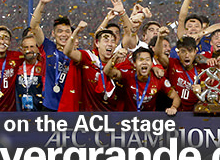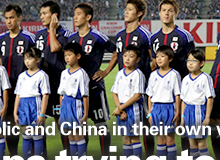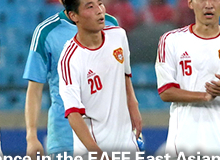The whole picture of the most prestigious tournament for Asian international teams held every four years has finally become clear. On the 26th March, the draw for the AFC Asian Cup Australia 2015 took place at the Sydney Opera House attended by Korea Republic international coach Hong Myung-Bo, Japan international technical director Hiromi Hara, and representatives of the other contenders.
Group A consists of hosts Australia, Korea Republic, Oman and Kuwait. Last tournament’s runners-up Australia have been reinforcing their squad and making it more youthful after their new coach Ange Postecoglou signed a long-term contract until June 2018. Their clash against Korea Republic, who aim to become Asian champions for the first time since 1960, is arguably the most anticipated tie of the group. “Not only Australia, they are all tough teams,” said Korea Republic coach Hong. He stays alert while concentrating on their own situation, adding: “The most important thing is how well we will prepare for the tournament.”

China and DPR Korea in a tough group
Group B, where the East Asian Football Federation (EAFF) members China and DPR Korea have been drawn together, also features competitive sides. The two EAFF members will have to deal with Saudi Arabia, competition-record six-time finalists and three-time winners, and Uzbekistan, who finished fourth last time. Saudi’s Spanish coach Lopez Caro showed his determination, saying: “Every team in the group has great quality, but we are eager to achieve good results.”
China already started their preparation to go beyond the group stage for the first time since their title winning 2004 campaign, by appointing Alain Perrin as new coach in February. “We will spend a year building a good team while finding the right balance between youngsters and veterans,” said the French boss, who has also had a spell in Qatar.

Korea DPR will participate twice in a row and for the fourth time, as winners of the AFC Challenge Cup 2012. Their target will be to earn a win for the first time in three tournaments.
Four Middle Eastern teams gather in Group C: Iran, United Arab Emirates (UAE), Qatar and Bahrain. Iran international coach Carlos Queiroz is looking forward to the ties with the three rivals, referring to the group mates as “opponents who stir up special tension and emotion.”
While Iran boast the best record in the tournament among the four, UAE are also successful, reaching the last four and then becoming runners-up in the 1990s. Bahrain made the last four in 2004 and Qatar the last eight in 2011, with both fighting tight battles against eventual winners Japan. Qatar coach Djamel Belmadi encouraged his players, declaring: “We are going to Australia to win the title.”
Champions Japan grouped with ex-winners Iraq
Japan, champions of the last tournament, were drawn into Group D with Jordan and Iraq as well as winners of the 2014 AFC Champions Cup. The first three teams played against one another in the Asian final qualifiers of the 2014 FIFA World Cup Brazil. Except for Japan’s 6-0 comfortable home win against Jordan, they waged tight battles with a one-goal difference. Ex-winners Japan and Iraq are deemed as top-two favourites, but Jordan coach Hossam Hassan argues “We can reach the next stage by continuing to give them competitive games,” hoping to survive the group stage.
Whatever the ending of the tournament, it is certain to be a fascinating spectacle. All eyes will be on Australia in January 2015.













